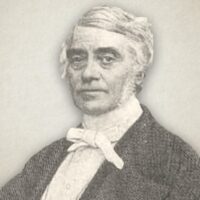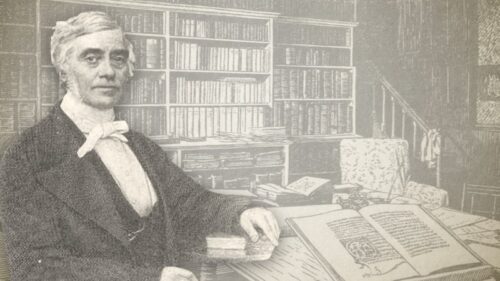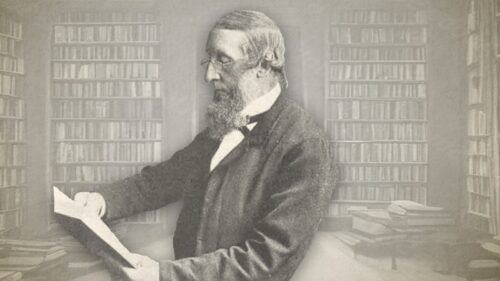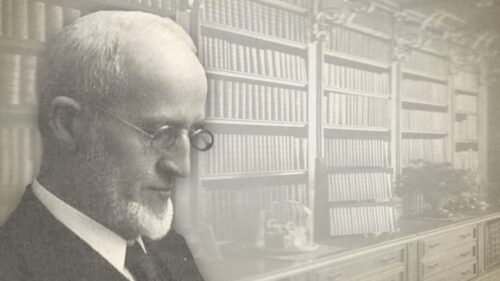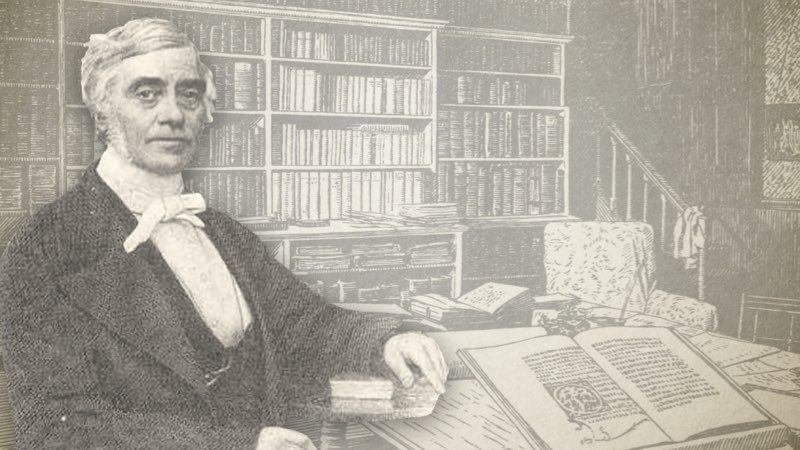
The Life And Influence Of Joseph Philpot
Gospel Standard 1871:
The Late Mr. Philpot
We do not need anything to remind us that it is a twelvemonth since our late friend and editor departed this life. The fact is brought most painfully to our mind every month, and almost every day of the month; certainly for twenty days in the month. But in turning over a hill of papers, we were reminded more strongly than usual by coming upon the following letters. They may be by some thought to be out of date; but they are not out of date with us, and will, we doubt not, be read with interest by many.
Dear Sir,…When I first read in the “Gospel Standard” of Mr. Philpot’s death, my soul ascended in solemn prayer, requesting the Lord, if according to his blessed mind and sovereign will, that his mantle might fall on some Elisha, and an equal if not a double portion of his Spirit be poured out upon him. My heart being full, I could not finish my tea. I opened and read the notes on the dear man’s death as well as I could, for one large drop was following the other in quick succession. I was almost overwhelmed. When I came to these words: “Better to die than to live!” “Mighty to save! Mighty to save!” “I die in the faith I have preached and felt!” “Well, I thought, “thou hast fought the fight and finished thy course with joy, and now gone up to receive the crown of righteousness, welcomed into the mansion prepared for thee by a precious Jesus with a ‘Well done, good and faithful servant; enter thou into the joy of thy Lord.'” And when I came to the word “Beautiful!” and to the question asked by his dear wife, “What’s beautiful?” “Ah!” thought I, “like your brother Paul, when he was caught up into the third heaven, the beautiful vision and revelation were not to be opened or revealed by a human tongue; its glories were too great for earth.” Our friend was not allowed to tell what he saw. We may form some idea of it, but we must leave it in the hands of the Lord. As death approached, calm as the summer sea, without a ruffling wave to wash the shore, such was his passage to the realms of day.
“He died to live, and lives to die no more.”
I first became acquainted with Mr. Philpot’s writings in the year 1837. His “Secession from the Church of England” was given me by a friend, and he advised me to take up the “Gospel Standard.” I did so, commencing in January, 1837, and I have continued it to the present day. My soul has often had a feast from the pen of your dear father, Mr. Warburton, Mr. M’Kenzie, and Mr. Philpot. I used to look through the “Standard” and read their letters first. In July, 1850, I went up to London to see a brother-in-law living at Islington, and knowing by the “Standard” that Mr. Philpot was to supply the pulpit at Eden Street chapel, I went away early, but missed my road, being a stranger. By inquiry I was set right again, and arrived just in time for the commencement of the service. Mr. Philpot preached from Ex. 15:25: “And he cried unto the Lord, and the Lord showed him a tree,” &c. He dwelt most particularly upon the Lord showing him a tree. I really enjoyed the subject. After service was over, I remained in the seat until the chapel was nearly empty, resolved in my mind to go and speak to Mr. P. “Well,” I said to myself, “you will cut me off the same as you did the ‘few poor wretched men;’ shall I go or shall I not? Well, I will go, although you may cut me off with even greater severity.” I went into the vestry and spoke to him. He received me very kindly; but he was very much fatigued in speaking, and was very poorly; so I bade him good bye and left.
I went again in the evening to hear him; but, having been unavoidably detained, I was late. I could only get standing room just inside the outside door, as the chapel was thronged. His text was Hos. 2:14, 15. What a delightful subject! Surely he went into all the holes and corners, picking out the Lord’s little ones. I thought, “Is it possible that a man of your eloquence and ability can ransack and bring forth such dark spots to light, and use such plain language as comes within the meanest capacity to comprehend?”
In July, 1865, I was again in London, and found my way to Gower Street. I heard Mr. P. from Eph. 3:14-17. His description of the indissoluble bond of union between the family of heaven and the living family on earth I shall never forget. My soul was like the chariots of Aminadab. I sat bathed in tears. I feel confident that I shall meet him again.
I close with Mr. Philpot’s language in the “Standard,” 1838 (p. 46): “That the ‘Gospel Standard’ may be ever lifted up in the cause of truth.”
An Old Subscriber
Alderney
Joseph Philpot (1802-1869) was a Strict and Particular Baptist preacher. In 1838 he was appointed the Pastor of the Churches at Oakham and Stamford, during which time he became acquainted with the Gospel Standard. In 1849, he was appointed the Editor for the Gospel Standard Magazine, a position he held for twenty-nine years (nine years as joint Editor and twenty years as sole Editor). John Hazelton wrote of him—
“A man of great grace, profound learning, and with a literary style equal to any of his contemporaries. For twenty years he was editor of the "Gospel Standard," in which his New Year's Addresses, Meditations, Reviews, and Answers to Correspondents were outstanding features. His ten volumes of sermons, entitled "The Gospel Pulpit," and his four volumes of "Early Sermons," testify to his powers as an expositor of the Word, to the beauty of his illustrations, and the heart-searching character of his ministry. He was born at Ripple, Kent, where his father was rector, and educated at Merchant Taylor's and St. Paul's schools, entering at Oxford University in 1821, taking a first-class, and ultimately becoming Fellow of his College. He accepted an engagement in Ireland as a private tutor, but prior to his departure he was unexpectedly detained at Oakham. There he bought a book, "Hart's Hymns," and was much struck by the beauty of many of them. In 1827, in Ireland, eternal things were first laid upon his mind, and "I was made to know myself as a poor lost sinner, and a spirit of grace and supplication poured out upon my soul." He returned to Oxford in the autumn, and "the change in my character, life, and conduct was so marked that everyone took notice of it." Early in 1828 he was appointed to the perpetual curacy of Chislehampton, with Stadhampton—or Stadham—not far from Oxford. He soon gained the love and esteem of his parishioners. His Church was thronged, and his labours were unceasing amongst young and old. In 1829 he became acquainted with William Tiptaft (1803-1864), vicar of Sutton Courtney, and a friendship commenced which death alone severed. Both ministers had been led to know the truths of predestination and election and the final perseverance of the saints, and preached them with unflinching boldness. Persecution soon arose; it always does in some quarter when there is a faithful ministry. In 1831 Tiptaft built a chapel at Abingdon, where he remained as a Baptist pastor until his death. In 1835 Mr. Philpot resigned his living and his fellowship; the temporal sacrifice entailed was such that he had to sell almost all his books. Soon after this momentous step had been taken he preached in a chapel at Newbury, which some of his friends had procured for the purpose. He writes: "When I therefore began to open up that God had a chosen and peculiar people the whole place seemed in commotion. One man called aloud, 'This doctrine won't do for me!' and started out, and was instantly followed by five or six others. I was not, however, daunted by this, but went on to state the truth with such measure of boldness and faithfulness as was given me. Some of my friends at the chapel thought that the people would have molested me, but no one offered to injure me by word or action, and I came safe out from among them." He also writes: “——is, I fear, something like the robin spoken of in 'Pilgrim's Progress, who can eat sometimes grains of wheat and sometimes worms and spiders. I am quite sick of modern religion; it is such a mixture, such a medley, such a compromise. I find much, indeed, of this religion in my own heart, for it suits the flesh well; but I would not have it so, and grieve it should be so." He preached much at Allington, near Devizes, and in the Metropolis, and many other places. His ministry was attended by crowds, and was blest to saint and sinner. In 1838 he became Pastor of the Churches at Oakham and Stamford, residing in the latter town till failing health caused his removal to Croydon. At the time of his settlement at Stamford he became associated with the "Gospel Standard," and in 1849 he was appointed editor. He was a most interesting writer on the things of God. His sermons are experimental rather than doctrinal, but when he treated of doctrine it was in a comprehensive and scriptural way, as his "Meditations" amply prove. His book on "The Eternal Sonship" practically closed the controversy which gave it birth. His "Reviews" are most instructive and brilliantly written. Would that the younger members of our Churches made a study of them! "The Advance of Popery" was another work which had a wide circulation, and events today prove the accuracy of the forecasts so solemnly made therein. His "Letters" have been a means of grace to many, and it is refreshing through them to know the spiritual history of some of the excellent of the earth in their day and generation, and to have glimpses of services at Eden Street, Gower Street, and Great Alie Street Chapels, and at Came and other places, especially in Wiltshire.”
Joseph Philpot's Letters
Joseph Philpot's Sermons



